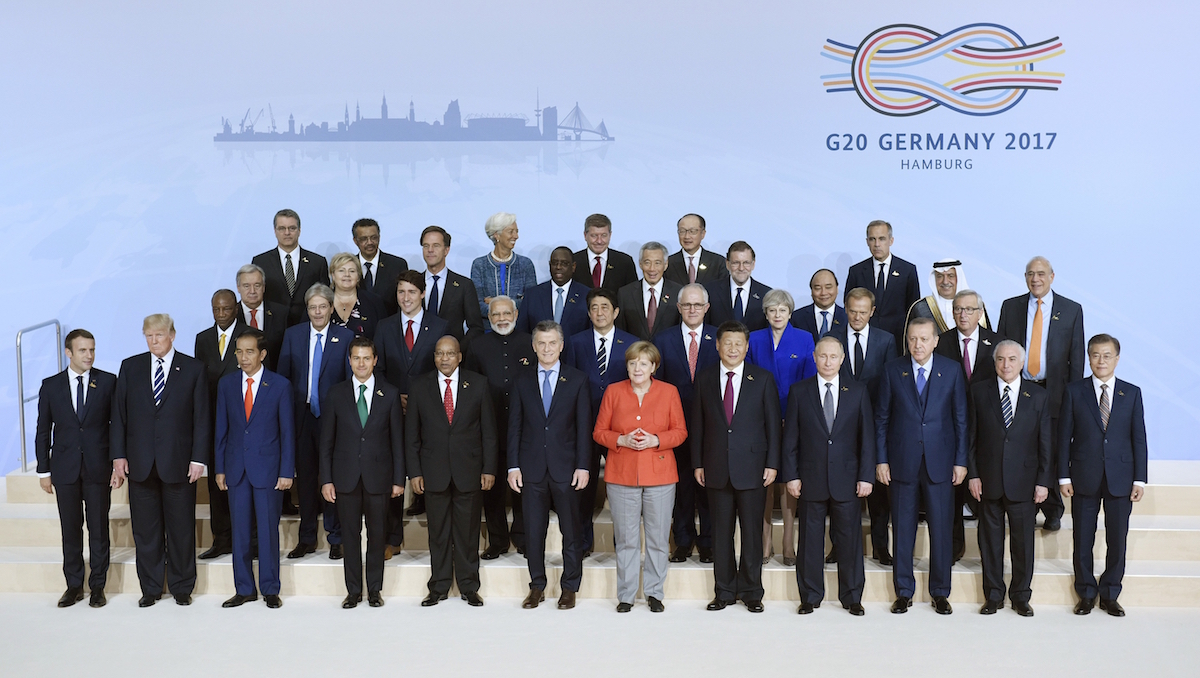The German Presidency will hold this year’s G-20 summit in Hamburg, succeeding the 2016 summit held by the Chinese presidency in Hangzhou.The summit will precede the German federal elections by seven weeks and constitutes a superb opportunity for the long-standing chancellor and electoral candidate Angela Merkel to present her vision of the role Germany is to play in the World.
Often classified as the ‘most powerful woman in the World’, Angela Merkel has been running the country for twelve years and, if polls are to be vindicated, she will continue to do so for at least another four years. The competition is now played between lesser political forces to see who is to become the junior partner of the ruling CDU/CSU in a future government coalition.
Under Helmut Kohl, Germany reunified and a single currency tailored according to the German model was introduced in Europe. Under Gerhard Schröder, Germany cultivated the ultra-competitiveness of high skills and organisation and ultra-low wages. Now, with Angela Merkel, a new European Treaty gave the country effective reigns on the European decision process.
The 2008 financial crisis could have spelled disaster for the Euro project, yet it did not. Greece suffered and continues to suffer an intolerably high price for a skewed policy; Ireland was able to redress damages quickly; others managed their economies with different levels of success, but the Euro survived. At the height of the crisis, as we now know, Ms Merkel was even able to circumvent her Minister of Finances and reach a direct deal with the Greek authorities.
The head of the European Central Bank, Mario Draghi, brought to Europe the ‘Quantitative easing’ that kept afloat other world economies, and in doing so he averted the collapse of the European currency. Here too Ms Merkel was skilful enough to combine orthodox pressure from the German financial establishment with sufficient flexibility to make it possible for the ECB to proceed with its ‘unconventional policy’.
On the external front, Germany continues to cultivate its long-term obsession for the conquest of external markets with complete disregard for the political consequences of its commercial acts. Although many other examples exist across the World, the management of the Ukrainian crisis is perhaps the most obvious as it relates to a political major threat operating close to German borders. Whereas Germany-sponsored trade initiatives played a major part in the unfolding of the crisis in Ukraine, and although Germany is the most engaged Western country sustaining Ukraine, the country could not resist the economic benefits of a Russian gas pipeline proposal that will be a big blow to Ukrainian interests.
Although since the start of her initial term Ms Merkel has been discreetly providing shelter to some of those who escape persecution from the Greater Middle East – women in particular – her attempt to transform these efforts into a global policy of asylum in 2015 had disastrous results. Here, as well, she was able to withdraw tactically and avoid a political collapse. Refugee pressure is again building up in Italy, but the far-right movement, having failed its bid in both the Netherlands and France, is no longer a threat to her political survival in Germany.
In all of these issues, Angela Merkel has excelled at the steering wheel, avoiding irremediable shocks, yet at the same time has always lacked a strategic vision. Is it now the right time for her to assume this leadership role?
The pace of change we have seen in China is stunning, as is the way the country has so far managed to move so quickly on the economic, social and scientific fronts while keeping a rearward political system. Whereas the international consensus has been that the Chinese political system will in due time be forced to adapt to its society, so far facts have proved this consensus wrong, as we are witnessing the revival of both the Maoist cult and political repression.
Western financial experts have been chronically concerned with the financial sustainability of the Chinese development model. The same western financial experts have seen Germany as the best example of financial stability. Ironically, however, a Chinese company recently rescued the Deutsche Bank by buying a major share in it.
The most striking Chinese success has been its ability to recycle its external trade surplus into the world’s most important instrument for investment in international infrastructure; under the ‘OBOR’ label or otherwise. Germany, which has by far the most important world trade surplus, stands in contrast with a small standing in supporting development around the world.
The G-20 Presidency would be the ideal time for Germany to announce a massive plan of sustainable development throughout the world that would be in proportion to its robust economic standing and in accordance with its declared commitment to the UN development goals. A plan that would at least match the financial means put forward by China while promoting an alternative strategy combining economic rationality with social responsibility, and in particular environmental sustainability.
It could as well be an opportunity to remind the world of the first principle of the Atlantic charter of August 1941: ‘the countries seek no aggrandizement, territorial or other’. It should be underlined how this principle was determinant in building peace, and how contrary to it are the occupation of the South China Sea and the invasions of Ukraine, Yemen or Syria.
It could also be reminded that one year later, in August 1942, John Maynard Keynes authored the ‘Proposals for an International Clearing Union’, proposals that were never to be fully implemented but could set the ground for a more stable and less conflictual international payments system.
The so-called ‘migrant crisis’ could then be reframed as a political and development crisis. After all, the reasons why there are millions of persons willing to risk their life to escape their land have to do with war, oppression and lack of the minimum conditions to see a better future in their own lands.
And a world feeling less threatened by the challenges of immediate survival, of vital competition for the ‘aggrandizement, territorial or other’ could be better placed to have a more careful look at the precious environmental equilibria of our planet as well as its vast heritage and collective responsibility to preserve it.
The summit could also agree on a common agenda for confronting terrorism and other aggressive features of jihadism, building on the momentum opened by the Riyadh Arab’s summit. As the Arab world is more and more conscious that modern jihadism is an attempt of manipulation of religion by a political agenda that has nothing to do with the interests of Arabs, we can now build a strong coalition against terrorism.
Even if Chancellor Merkel will achieve only a small fraction of this, she might succeed in being remembered not only for being a politician capable of adapting to the general public mode, but also able to set a strategy for her country.



